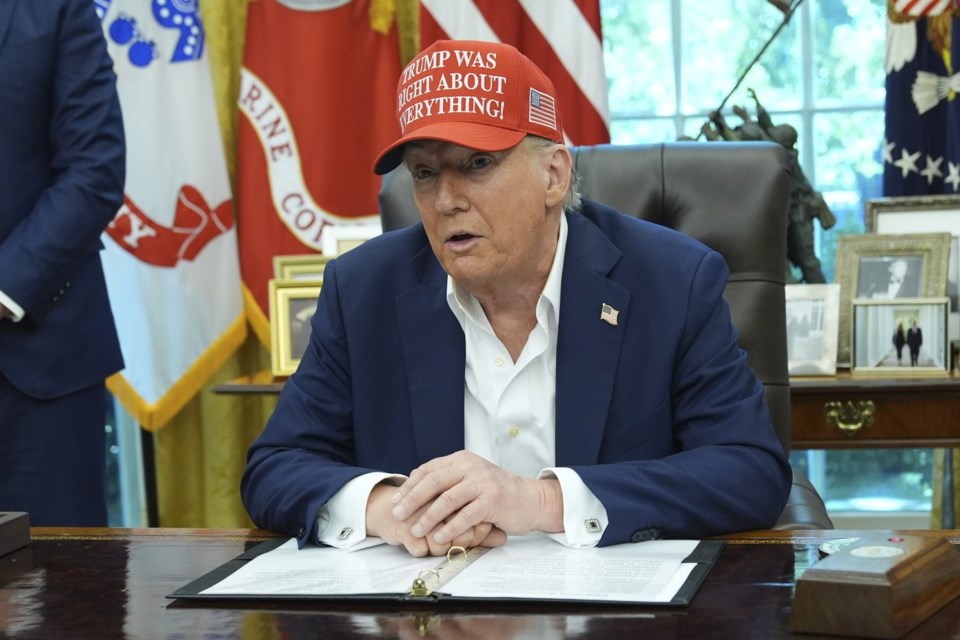CHICAGO (AP) — President Donald Trump on Friday said Chicago will likely be the next target of his efforts to crack down on crime, homelessness and illegal immigration.
Trump indicated that the Midwestern city could receive similar treatment to what he's done in Washington, D.C., where he's deployed 2,000 troops on the streets.
“I think Chicago will be our next,” Trump told reporters at the White House, later adding, “And then we’ll help with New York.”
The comments came as the Pentagon on Friday began ordering troops in Washington to carry firearms, though there have been no overt indications they have faced threats that would require them to carry weapons.
Trump has repeatedly described some of the nation's largest cities — run by Democrats, with Black mayors and majority-minority populations — as dangerous and filthy.
He singled out Chicago on Friday, calling it a “mess” and saying residents there are “screaming for us to come" despite significant decreases in crimes of violence.
Trump’s suggestion that Chicago might be the next target for a crackdown on crime didn't sit well with Illinois officeholders.
Chicago Mayor Brandon Johnson said his office has not received formal communication from the Trump administration about military or federal law enforcement deployments in Chicago but said “we have grave concerns about the impact of any unlawful deployment of National Guard troops.”
Johnson called Trump's approach “uncoordinated, uncalled for, and unsound,” arguing it “has the potential to inflame tensions between residents and law enforcement.”
It is unclear how Trump would pursue an effort in Chicago that is similar to his approach to D.C., where home rule laws give the federal government greater authority.
However, the president's eldest son said it might be time to look at a whole host of cities in the Pacific Northwest. In an interview Thursday with Newsmax, Donald Trump Jr. blamed Democrats for “through-the-roof” murder rates.
“Maybe we should roll out the tour to Portland, Seattle, the other craphole cities of the country,” Trump Jr. said.
In a post on X entitled “Things People are Begging For,” Gov. JB Pritzker, a Democrat, included cheaper groceries, no cuts to Medicaid or food aid for low-income families, and the release of federally held files on Jeffrey Epstein, the convicted sex trafficker and former Trump friend.
What they are not begging for, Pritzker continued, is “an authoritarian power grab of major cities.”
U.S. Sen. Dick Durbin of Illinois, the Senate's No. 2 Democrat, called Trump's Washington, D.C. strategy “political theater." He said Chicago is “a beautiful, vibrant city with people from all walks of life” and suggested pursuing “proven bipartisan solutions” toward further crime reduction.
“These unprecedented threats from President Trump are nothing more than a power grab to distract from his disastrous policies,” Durbin said in a statement.
Democratic Sen. Tammy Duckworth, an Army National Guard combat veteran, criticized what she called Trump's misuse of the military to “intimidate Americans in our own communities."
Lisa Hernandez, chair of the Democratic Party of Illinois, called Trump's comments “offensive and false” and argued his rhetoric echoes a history of racist narratives about urban crime.
“Chicagoans are not begging for him,” she told The Associated Press.
Trump has taken aim at Chicago for over a decade, including on the 2024 and 2016 presidential campaign trails. He has repeatedly compared the city to Afghanistan and, in 2017, threatened to “send in the feds” due to gun violence in the city, despite historic declines in violent crime in recent years.
Violent crime in Chicago dropped significantly in the first half of the year, representing the steepest decline in over a decade, according to city data. Shootings and homicides were down more than 30% in the first half of 2025 compared to the same time last year, and total violence crime dropped by over 22%.
Johnson touted the city’s approach to violent crime, asserting in a statement to The Associated Press that “our communities are safest when we fully invest in housing, community safety, and education.” While Trump turns to the military, he said Chicago has invested in mental health services, community-based interventions, raising minimum wages and improving affordable housing.
If he wants to make the city safer, Johnson said, Trump should restore $158 million he cut in violence-prevention programs for cities such as Chicago.
"There are many things the federal government could do to help us reduce crime and violence in Chicago, but sending in the military is not one of them," he said.
Pastor Donovan Price, a local advocate for gun crime victims, emphasized that community-based anti-violence programs, rather than militarism, is key to reducing gun violence in Chicago.
“Stay out of our city," he said. "This is not a federal issue. We live this every day. We know what our community needs.”
___
O'Connor reported from Springfield, Illinois. Price reported from Washington, D.C.
Christine Fernando, John O'connor And Michelle L. Price, The Associated Press



